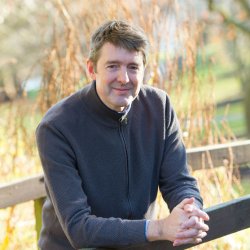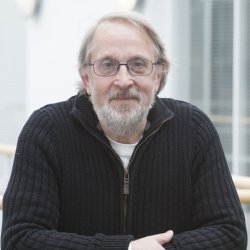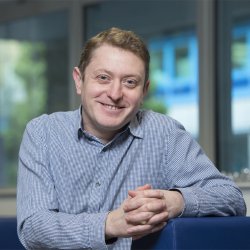Advances in ion beam implantation and creation of new sources through collaboration between the University of Surrey & Ionoptika
Dr David Cox is a Senior Research Fellow at the University of Surrey. His research is based around the use of focused ion beams for nanofabrication. David is the Principal Investigator on the recently won Commercialising Quantum Technologies Innovate UK project, led by Hampshire based company, Ionoptika, entitled “Rapid and Scalable Single Colour-Centre Implantation for Single Photon Sources”. The total project cost is £500k with a duration of 18 months.
The University of Surrey’s partnership with Ionoptika began over 5 years ago with their involvement in a 3-year EPSRC quantum infrastructure project called SIMPLE (Single Ion Multispecies Positioning at Low Energy). Ionoptika delivered the new single ion implantation tool, SIMPLE, that was launched at the UK National Ion Beam Centre at the University of Surrey. The Ion Beam Centre allows users to undertake a wide variety of research using ion implantation, ion irradiation and ion beam analysis. The SIMPLE tool allows the injection of single atoms of a range of species into practically any substrate with a target accuracy of about ten nanometers. The tool is unique as it can count the atoms one-by-one as they arrive, whereas traditional implanters can only implant single atoms by trial and error - this means that you only get the desired single atom on occasion, but do not know which occasions were the successful ones.
Through the EPSRC Centre for Doctoral Training in Micro and Nano Material and Technologies, an EngD student was recruited to support the project, being placed at Ionoptika for the first two years and the Ion Beam Centre for the final two years.
Established in 1994, Ionoptika, are a small company but one of the leading providers of high-performance ion beam technologies for surface analysis and nanofabrication applications. They are the experts in cluster ion beams for secondary ion mass spectrometry. Their product range extends from whole instrumentation to individual ion beams, components, and accessories. Following on from the successful SIMPLE project, Ionoptika also now offers the Q-One Ion instrument for deterministic single ion implantation.
To develop the partnership beyond the SIMPLE project, Dr David Cox and Ionoptika applied for a University of Surrey SME Innovation Voucher in 2019. The £8.5k, 3-month feasibility study, enabled Ionoptika to access tooling at the University of Surrey and the expertise of Dr David Cox to undertake research into advances in the manufacture of liquid metal ion sources and start to put together a new methodology to make ion sources. The study formed the starting point of a larger collaboration.
Introduced through the University of Surrey, Ionoptika joined the SETsquared Scale-Up Programme in 2020 and were awarded £4k grant writing support through the Programme to prepare a joint grant application with the University of Surrey to the Innovate UK Commercialising Quantum Technologies call in 2021. The support of the SETsquared quantum campaign team and the University of Surrey Innovation Advisor were key to the success of the application. The successful project “Rapid and Scalable Single Colour-Centre Implantation for Single Photon Sources” involves Dr David Cox, Professor Ben Murdin, Professor Roger Webb and Dr Steve Clowes from the University of Surrey. The project has also enabled the employment of a postdoctoral researcher who was a PhD student at the University of Surrey. The project will further develop Ionoptika’s commercial Q-One Ion Implantation instrument in parallel with the SIMPLE tool , introducing new sources and capabilities to meet the growing demand for new species and projects. It will develop new rare earth sources which are potential single photon sources and quantum memory qubits and will establish the UK as a global leader of quantum technology device research and manufacturing.
Collaboration with the University of Surrey has enabled Ionoptika to gain access to world-class facilities and expertise and participate in a major research project. This will help the company to expand their range of available sources and increase their sales of the Q-OneTM single ion implantation instrument which allows individual ions/qubit atoms to be placed with high precision, repeatedly in very large numbers. This will significantly expand their annual revenue, create new highly skilled STEM jobs, and enable Ionoptika to maintain their position as world leaders in the field.
The collaboration is continuing to grow with the recent award of £444k EPSRC funding for a 3-year project entitled “Roadmap for Applications of Implanted Single Impurities Network” (RAISIN), led by Principal Investigator Dr Steve Clowes and including Dr David Cox and Ionoptika. This international network will promote and facilitate collaborations between groups that are leading on the development of the tools that will enable implanted single impurities and are at the leading edge of quantum technologies and sciences, maximising the benefits the world can gain from this new field. RAISIN will be forward looking, with a strong emphasis on the quantum technologies and sciences that it will enable, as well as the implanted single impurities development. The network will include, but not be limited to, annual international workshops, a monthly webinar series, plus funding to support international collaborative exchanges.
The University of Surrey is well placed to lead the way in this research because of the expertise and the outstanding facilities, including the single-ion implanter, SIMPLE, within our UK National Ion Beam Centre. The outcome of the research aims to help the discovery of new drugs, improve modelling for climate change, and revolutionise cybersecurity.



